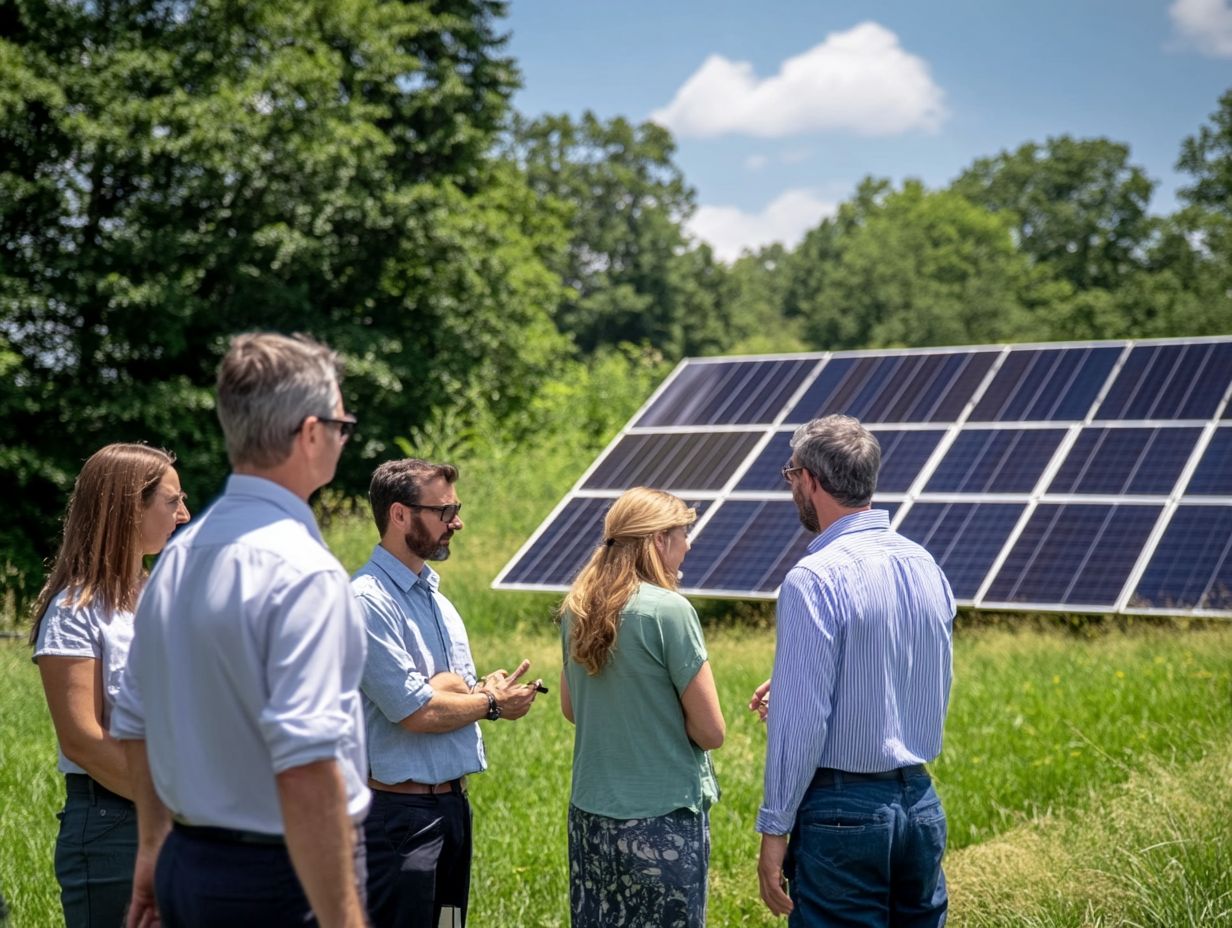Contents
- 1 The Importance of Renewable Energy and Sustainability Goals
- 2 What is Solar Energy?
- 3 The Role of Solar Energy in Promoting Sustainability
- 4 The Future of Solar Energy and Sustainability
- 5 Integrating Solar Energy into Your Sustainability Strategy
- 6 Frequently Asked Questions
- 6.1 What is solar energy and how does it contribute to sustainability goals?
- 6.2 The Role of Solar Energy in Achieving a Sustainable Future
- 6.3 Sustainability Goals Achievable Through Solar Energy
- 6.4 Economic Sustainability Through Solar Energy Usage
- 6.5 Challenges in Implementing Solar Energy as a Sustainable Source
- 6.6 Contributing to Sustainability Goals: The Role of Solar Energy for Individuals and Businesses
The Importance of Renewable Energy and Sustainability Goals

Your sustainability goals are key in shaping the future. They help you meet your current needs while also protecting the environment for generations to come by embracing renewable energy sources and sustainable urban planning.
By focusing on sustainable practices, you can significantly reduce your ecological footprint, conserve resources, and fight climate change. This approach involves a mix of strategies, like optimizing energy efficiency, supporting renewable resources, promoting energy independence through innovation, and enhancing energy security and ecosystem preservation.
Achieving these goals calls for collective efforts and public awareness initiatives to drive social equity and environmental protection. Integrating sustainability into your everyday life is essential for holistic sustainable development and maintaining long-term ecological balance.
United Nations. (2015). Transforming our world: the 2030 Agenda for Sustainable Development. Link
Understanding the Concept
Understanding sustainability means recognizing how environmental, economic, and social factors are all interconnected and contribute to your well-being and the planet’s health, which is crucial for future generations. This knowledge is key because it sets the stage for you and your community to adopt sustainable practices that promote longevity, resilience, and biodiversity.
You can look to renewable energy sources—like solar, wind, and hydroelectric power—as essential alternatives to fossil fuels. These options can help cut down on greenhouse gas emissions and pollution, supporting climate action and climate justice.
Plus, improving energy efficiency in your home or business by using better insulation, efficient appliances, and being mindful of how you consume energy can further shrink your ecological footprint, contributing to carbon neutrality and sustainable development.
By embracing sustainable practices—like reducing waste, supporting local agriculture, and using public transportation—you can actively play a role in creating a more sustainable future. This way, you’re helping ensure that future generations inherit a healthier planet, promoting environmental sustainability and climate resilience.
What is Solar Energy?
Solar energy is a fantastic form of renewable energy that you can harness from the sun’s rays, and it’s quickly becoming one of the most popular clean energy sources out there today, supporting the transition to a low-carbon economy.
By using solar panels and photovoltaic cells, you can efficiently convert sunlight into electricity, helping to build a sustainable energy future. This technology doesn’t just generate energy; it also plays a crucial role in cutting down greenhouse gas emissions, minimizing your carbon footprint, and fostering renewable energy systems.
As you navigate the energy transition, solar energy really shines as a promising solution for boosting energy independence, promoting ecological sustainability, and contributing to sustainable energy systems.
Definition and Explanation
Solar energy is all about harnessing the energy you get from the sun’s radiation, which you can turn into electricity or heat using different technologies, making significant strides in solar efficiency and energy generation.
Basically, this process allows you to tap into sunlight as a sustainable energy source for all sorts of applications. One of the most popular technologies is solar panels, which use photovoltaic (PV) cells to convert sunlight directly into electricity, supporting your journey towards emission reduction and energy equity.
You can install these panels on your rooftop or in large solar farms to create renewable electricity that powers your home, business, or even your electric vehicle. Then there are solar thermal systems, which capture the sun’s heat to produce hot water or generate steam for heating or powering turbines, aiding in the development of sustainable infrastructure.
The beauty of solar energy is its versatility—it can fit into residential heating systems, industrial processes, and large-scale power plants. As a clean and plentiful resource, solar energy helps reduce your dependence on fossil fuels and combats climate change, paving the way for a more sustainable future by contributing to climate mitigation and environmental stewardship.
The Role of Solar Energy in Promoting Sustainability

Solar energy is a key player in sustainability, offering you an eco-friendly alternative to traditional fossil fuels. By using solar power, you can significantly cut down on greenhouse gas emissions, enhance ecological sustainability, and foster energy independence and climate goals.
When more people adopt solar energy, it not only helps fight climate change but also encourages resource conservation, boosts energy independence, and supports the broader adoption of renewable energy sources.
By integrating solar technology into your energy systems, you can help contribute to cleaner, more resilient communities that prioritize the well-being of the environment and future generations, advancing sustainable development and energy transition strategies.
Reducing Carbon Emissions
One of the biggest perks of solar energy is how much it can cut down on carbon emissions linked to fossil fuels, contributing to net-zero emissions and climate action.
Unlike traditional energy sources like coal and natural gas, which significantly contribute to greenhouse gas emissions, solar energy taps into the sun’s power without spewing harmful pollutants into the air. The International Renewable Energy Agency even points out that transitioning to solar could reduce emissions by as much as 80% in power generation by 2050, which would lead to a serious drop in global warming potential and environmental impact.
Reducing carbon emissions doesn’t just help with climate change; it also means cleaner air, which is a win for public health. Research shows that cutting greenhouse gas emissions could save millions of lives worldwide, highlighting just how impactful solar energy can be for both our planet and our communities, promoting urban development and energy literacy.
Conserving Natural Resources
Solar energy is a game-changer when it comes to conserving natural resources. It offers you a sustainable alternative to those conventional energy sources that rely heavily on finite resources, supporting efforts in land conservation and solar adoption.
Making this switch doesn’t just help keep fossil fuels from running out; it also cuts down on the ecological footprint that comes with extracting and using them. By tapping into the sun’s endless power, you can significantly reduce your dependence on coal, oil, and natural gas, fostering a culture of green technology and clean technology.
Plus, by adopting sustainable practices like using energy-efficient appliances, properly insulating your home, and embracing smart home technologies, you can really boost your energy savings and contribute to energy policy and energy conservation efforts.
Integrating solar panels on your rooftop or participating in community solar farms helps lower greenhouse gas emissions and encourages a culture of environmental responsibility. This not only benefits you but also inspires others to get on board with green technologies, supporting the circular economy and corporate responsibility.
Building Sustainable Communities
Integrating solar energy into your local infrastructure is key to building sustainable communities that value energy independence and social equity, driving the adoption of solar initiatives and sustainable energy systems.
By tapping into the abundant power of the sun, you can significantly cut down on reliance on fossil fuels. This not only helps reduce greenhouse gas emissions but also lowers energy costs for you and your neighbors, supporting energy alternatives and energy access.
Take community solar projects, for example; they allow multiple households to share the perks of a single solar installation. This means that even lower-income families can enjoy renewable energy without needing individual rooftop panels, advancing climate mitigation and promoting energy equity.
These projects do more than just enhance energy access—they also create local jobs and boost skill development in the renewable energy sector, fostering community engagement and economic sustainability.
A great example of this is the Solar Landscape initiative in New Jersey, which has made affordable solar options available to underserved communities. It’s a shining example of how to achieve greater social equity, community resilience, and environmental regulations while also pushing towards sustainable development goals.
The Future of Solar Energy and Sustainability

The future of solar energy looks bright for you, with ongoing advancements in solar technology, such as solar research and power generation, creating a more sustainable and resilient energy landscape.
As we shift towards an energy transition, solar power provides innovative solutions to meet your growing energy needs while keeping environmental impacts in check, supporting the development of sustainable energy systems and policy frameworks.
With more investment pouring into clean energy initiatives, the potential for solar energy to boost climate resilience, support environmental stewardship, and help achieve sustainability goals is better than ever.
Advancements and Potential Impact
Recent advancements in solar technology, like enhanced photovoltaic cells and innovative energy storage solutions, are about to shake up the renewable energy scene, fostering technological innovation and grid integration.
These new technologies have significantly improved energy conversion efficiencies, so you can get more electricity from the same amount of sunlight with solar panels. Breakthroughs in battery storage mean you can hang on to more energy, providing a steadier power supply even when the sun isn’t shining, supporting energy mix and energy demand.
This progress not only makes solar investments more economically viable for you but also plays a key role in supporting climate resilience and carbon offsetting by reducing greenhouse gas emissions.
By cutting down on reliance on fossil fuels, these advancements help create a more sustainable energy transition. They’re paving the way for a cleaner and more reliable energy system that can meet the growing demands of an environmentally conscious society like yours, promoting environmental sustainability and sustainable agriculture.
Integrating Solar Energy into Your Sustainability Strategy
Incorporating solar energy into your sustainability efforts can really boost your environmental impact and promote energy efficiency, supporting climate action and environmental impact reduction.
By adopting solar technology, such as solar panels, you can lower your carbon footprint, save on energy costs, and help create a cleaner environment, supporting sustainable practices and reducing waste.
Plus, if you take advantage of the solar incentives out there, you’ll find that making the switch is not only easier but also more financially feasible, supporting corporate responsibility and public health.
Practical Tips and Considerations
To really make solar energy work for your sustainability efforts, consider some practical tips like evaluating your energy needs, enhancing energy efficiency, and checking out the right solar panel options for you, including the latest photovoltaic cells and solar technology.
Start by taking a good look at your current energy efficiency to figure out how much power you actually need. This analysis can seriously influence your choice of solar technology and energy generation options, contributing to overall sustainability and emission reduction.
And don’t forget to explore energy storage solutions, like batteries, to get the most out of your solar system during peak demand times or when the sun isn’t shining, thereby enhancing grid integration and energy independence.
Understanding the long-term benefits of clean energy technology—like financial savings, resource conservation, and a positive environmental impact—will help you make informed choices that suit your unique situation. Consulting with professionals can give you tailored insights specific to your needs, ensuring you tap into the full potential of solar energy and contribute to sustainable development and ecological balance.
Jordan, D. C., & Kurtz, S. R. (2013). Photovoltaic degradation rates—an analytical review. Progress in Photovoltaics: Research and Applications, 21(1), 12-29. Link
Frequently Asked Questions

What is solar energy and how does it contribute to sustainability goals?
Solar energy is a renewable source of energy that is harnessed from the sun’s radiation using solar panels and solar thermal technologies. It contributes to sustainability goals by reducing our dependence on non-renewable sources of energy, such as fossil fuels, thus decreasing carbon emissions and promoting cleaner air and water.
The Role of Solar Energy in Achieving a Sustainable Future
Solar energy helps in achieving a sustainable future by providing a clean and renewable source of energy that is not harmful to the environment. It also reduces our reliance on fossil fuels, which are non-renewable and contribute to climate change.
Sustainability Goals Achievable Through Solar Energy
Solar energy can help achieve various sustainability goals, such as:
- Reducing carbon footprint and greenhouse gas emissions
- Promoting energy independence
- Creating green jobs
- Reducing the overall environmental impact of our energy consumption
- Supporting renewable resources
Economic Sustainability Through Solar Energy Usage
The use of solar energy contributes to economic sustainability by reducing our dependence on expensive and finite sources of energy, such as fossil fuels, and by supporting a transition to a low-carbon economy. It also creates job opportunities in the solar industry, stimulates local economies, and promotes solar investments. Additionally, solar energy can lead to long-term savings on energy bills for individuals and businesses.
Challenges in Implementing Solar Energy as a Sustainable Source
Some challenges in implementing solar energy as a sustainable energy source include high initial costs, the need for proper infrastructure and technology, such as sustainable infrastructure and energy mix diversification, and intermittent energy production due to weather conditions. However, advancements in green technology, solar incentives, and government policy frameworks are helping to overcome these challenges.
Contributing to Sustainability Goals: The Role of Solar Energy for Individuals and Businesses
Individuals and businesses can contribute to sustainability goals by installing solar panels on their homes or buildings, investing in community solar projects, and supporting policies that promote the use of renewable energy sources and clean energy. They can also reduce their overall energy consumption by using energy-efficient appliances, implementing energy-saving practices, and participating in solar initiatives that drive solar adoption and promote a circular economy. Consider exploring solar energy solutions to make a positive impact on sustainability.







